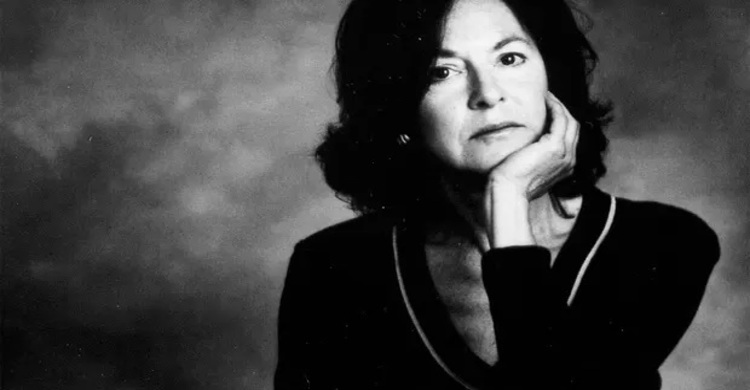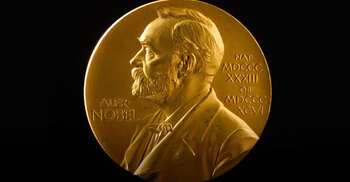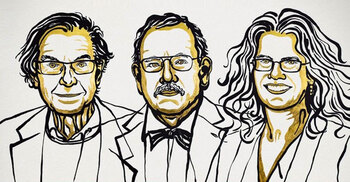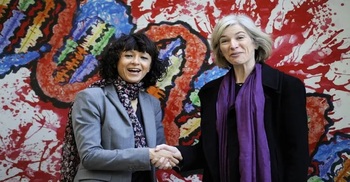American poet Louise Gluck wins Nobel Literature Prize

The poet Louise Glück has become the first American woman to win the Nobel prize for literature in 27 years.
Glück, cited for “her unmistakable poetic voice that with austere beauty makes individual existence universal”, is the 16th woman to win the Nobel, and the first American since Toni Morrison took the prize in 1993.
One of America’s leading poets, the 77-year-old writer has won the Pulitzer prize and the National Book Award, tackling themes including childhood and family life, often reworking Greek and Roman myths.
The chair of the Nobel prize committee, Anders Olsson, hailed Glück’s “candid and uncompromising” voice, which is “full of humour and biting wit”. Her 12 collections of poetry, from Faithful and Virtuous Night to The Wild Iris are “characterised by a striving for clarity”, he added, comparing her to Emily Dickinson with her “severity and unwillingness to accept simple tenets of faith”.
“In her poems, the self listens for what is left of its dreams and delusions, and nobody can be harder than she in confronting the illusions of the self,” Olsson said. “But even if Glück would never deny the significance of the autobiographical background, she is not to be regarded as a confessional poet.”
The Nobel committee singled out Snowdrops, a poem from her Pulitzer-winning collection The Wild Iris, in which she evokes the return of life after winter. “I did not expect to survive, / earth suppressing me,” Glück writes. “I didn’t expect / to waken again, to feel / in damp earth my body / able to respond again … ”
Olsson called her collection Averno, an interpretation of the myth of Persephone’s descent into hell with Hades, “masterly”, adding that the National Book Award-winning collection Faithful and Virtuous Night is “another spectacular achievement.
“The reader is again struck by the presence of voice and Glück approaches the motif of death with remarkable grace and lightness,” he said. “She writes oneiric, narrative poetry recalling memories and travels, only to hesitate and pause for new insights. The world is disenthralled, only to become magically present once again.”
The award will mark a change for a writer who has often avoided the spotlight. When Glück was appointed as US poet laureate in 2003, she said she had “no concern with widening audience”, and that she preferred her audience “small, intense, passionate”.
Olsson confirmed that he has already spoken with the poet to tell her she has won. “The message came as a surprise but a welcome one, as far as I could tell,” he said, “early in the morning as it was.”
The last poet to win the Nobel was the Swedish writer Tomas Tranströmer, who took the prize in 2011.
American writers’ hopes of winning the Nobel had been lowered in 2008, when the then permanent secretary of the Swedish Academy Horace Engdahl said that US writers were “too sensitive to trends in their own mass culture”.
“The US is too isolated, too insular. They don’t translate enough and don’t really participate in the big dialogue of literature,” Engdahl said at the time. “That ignorance is restraining. Of course there is powerful literature in all big cultures, but you can’t get away from the fact that Europe still is the centre of the literary world ... not the United States.”
This year the prize is worth 10m Swedish kronor (£870,000). It is awarded by the 18-strong Swedish Academy to the writer they deem has fulfilled the condition laid out in the somewhat murky words of Alfred Nobel’s will: to “have produced in the field of literature the most outstanding work in an ideal direction”.
After enduring almost three years of scandal, observers had predicted the Swedish Academy would go for a “safe choice” this year, with Canadian poet Anne Carson, Antiguan-American writer Jamaica Kincaid, Chinese novelist Yan Lianke, Russian novelist Lyudmila Ulitskaya, Japanese bestseller Haruki Murakami and perennial contender Ngũgĩ wa Thiong’o, the Kenyan novelist, poet and playwright, named as possible winners. Of the 116 previous Nobel literature laureates, 15 were women, and the last Black African writer was Wole Soyinka, in 1986.
The august and secretive voting body was rocked by allegations of sexual abuse and financial misconduct in 2017, culminating in the conviction of Jean-Claude Arnault, husband of academy member Katarina Frostenson, for rape in 2018. Frostenson subsequently left the Academy after she was discovered to have leaked the names of former winners, and a string of resignations from Academy members followed, with the 2018 award postponed.
Announcing the 2018 and 2019 winners last year, the Academy was hoping for an end to criticism, with Anders Olsson, chair of the Nobel prize in literature committee, promising that the jury was “looking all over the world” for winners, and moving away from a Eurocentric, male-oriented focus. Instead, they chose two European writers, the widely-acclaimed Polish author Olga Tokarczuk, and the Austrian writer Peter Handke, a choice which was widely criticised over Handke’s denial of Serb atrocities during the war in the former Yugoslavia.
Source: The Guardian






